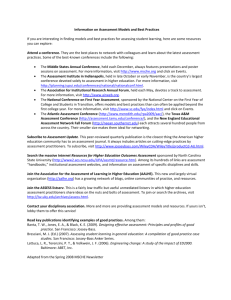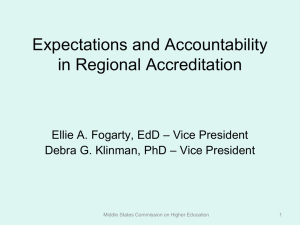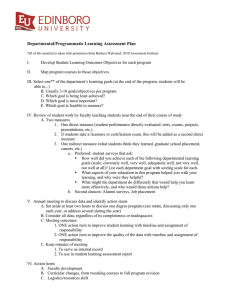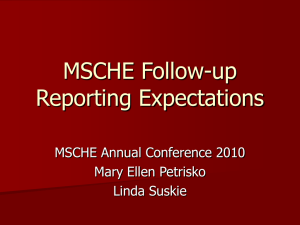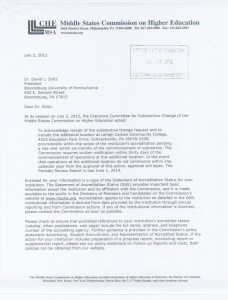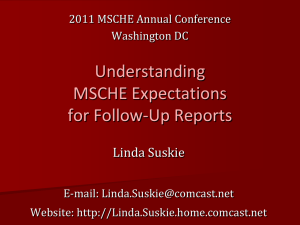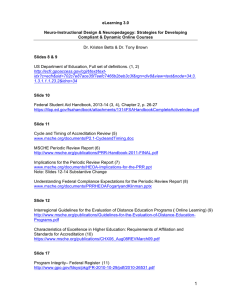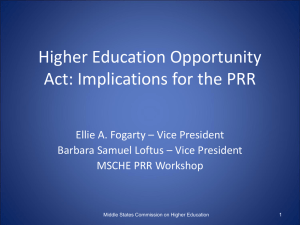Newsletter July 2015
advertisement
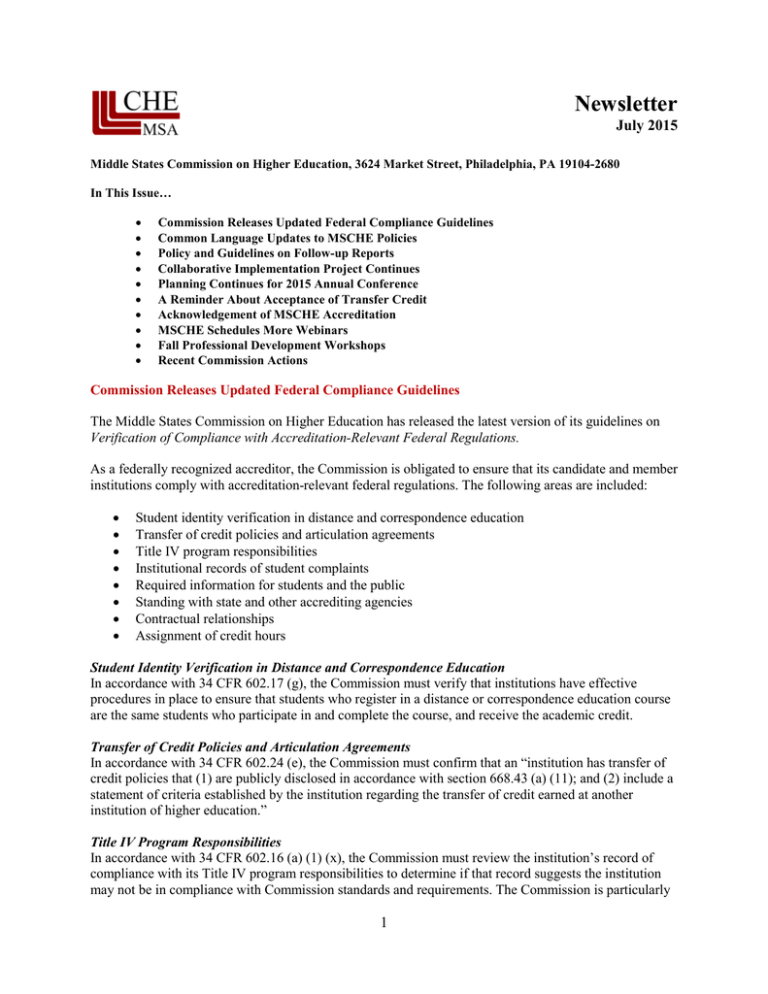
Newsletter July 2015 Middle States Commission on Higher Education, 3624 Market Street, Philadelphia, PA 19104-2680 In This Issue… • • • • • • • • • • Commission Releases Updated Federal Compliance Guidelines Common Language Updates to MSCHE Policies Policy and Guidelines on Follow-up Reports Collaborative Implementation Project Continues Planning Continues for 2015 Annual Conference A Reminder About Acceptance of Transfer Credit Acknowledgement of MSCHE Accreditation MSCHE Schedules More Webinars Fall Professional Development Workshops Recent Commission Actions Commission Releases Updated Federal Compliance Guidelines The Middle States Commission on Higher Education has released the latest version of its guidelines on Verification of Compliance with Accreditation-Relevant Federal Regulations. As a federally recognized accreditor, the Commission is obligated to ensure that its candidate and member institutions comply with accreditation-relevant federal regulations. The following areas are included: • • • • • • • • Student identity verification in distance and correspondence education Transfer of credit policies and articulation agreements Title IV program responsibilities Institutional records of student complaints Required information for students and the public Standing with state and other accrediting agencies Contractual relationships Assignment of credit hours Student Identity Verification in Distance and Correspondence Education In accordance with 34 CFR 602.17 (g), the Commission must verify that institutions have effective procedures in place to ensure that students who register in a distance or correspondence education course are the same students who participate in and complete the course, and receive the academic credit. Transfer of Credit Policies and Articulation Agreements In accordance with 34 CFR 602.24 (e), the Commission must confirm that an “institution has transfer of credit policies that (1) are publicly disclosed in accordance with section 668.43 (a) (11); and (2) include a statement of criteria established by the institution regarding the transfer of credit earned at another institution of higher education.” Title IV Program Responsibilities In accordance with 34 CFR 602.16 (a) (1) (x), the Commission must review the institution’s record of compliance with its Title IV program responsibilities to determine if that record suggests the institution may not be in compliance with Commission standards and requirements. The Commission is particularly 1 interested in reviewing significant deficiencies and material weaknesses that have been identified and any corrective action plans that have been developed to address those deficiencies and material weaknesses. Institutional Record of Student Complaints This is one of the new compliance areas. In accordance with 34 CFR 602.16 (a) (1) (ix), the Commission must confirm that institutions have effective policies and procedures for tracking and resolving student complaints. Required Information for Students and the Public This is another compliance area that is new to MSCHE. In accordance with 34 CFR 602.16 (a) (1) (iv), the Commission must confirm that institutions make available to students and the general public fair, accurate, and complete information in catalogs, handbooks, and other publications regarding the institution’s calendar, grading, admissions, academic program requirements, tuition and fees, and refund policies. In addition, the Commission must verify that institutions collect and post information on their websites concerning student performance in academic programs and their successful completion. Information should also be available regarding student employment after graduation and performance on licensing exams, as appropriate. Finally, in accordance with 34 CFR 602.33 (d), the Commission must verify that institutions provide clear and accurate information in their advertising and recruitment material about their accreditation status with MSCHE. Standing with State and Other Accrediting Agencies This is also a new compliance area to be reviewed by MSCHE. In accordance with 34 CFR 602.28, the Commission must verify that an institution is properly authorized or licensed to operate and is in good standing with each state in which it is authorized to operate. In addition, if the institution has status with a specialized, programmatic, or institutional accrediting agency recognized by the U.S. Department of Education, the Commission must verify that the institution is in good standing with the agency or agencies. Contractual Relationships Yet another compliance area that is now part of MSCHE’s review, in accordance with 34 CFR 602.22 (a) (2) (vii), the Commission is required to review any contractual arrangements an institution enters into with an organization that is not certified to participate in the Title IV HEOA programs, and offers more than 25 percent of one or more of the accredited institution’s educational programs. As institutions seek to improve the ways in which they provide education to their students, they may find it more practical or efficient to contract with other institutions or organizations to provide certain components of the educational experience. Any institution accredited by MSCHE is held responsible for all activities carried out under the institution’s name. Assignment of Credit Hours In accordance with 34 CFR 602.24 (f), the Commission “must conduct an effective review and evaluation of the reliability and accuracy of the institution’s assignment of credit hours.” Specifically, the Commission must review the institution’s policies and procedures for determining the credit hours awarded as well as the application of the institution’s policies and procedures to its programs and coursework, and make a “reasonable determination of whether the institution’s assignment of credit hours conforms to commonly accepted practice in higher education.” The Commission’s new booklet, Verification of Compliance with Accreditation-Relevant Federal Regulations, 2016, contains more detailed information on the Commission’s expectations for institutions and peer evaluators. To download a copy, click on www.msche.org/publications/VerificationofCompliance2016.pdf. 2 Common Language Updates to MSCHE Policies MSCHE continues to update policies to reflect the common accreditation language that was adopted last year by the seven regional accreditors. Most recently modified were the policies on Institutional Responsibilities in the Accreditation Process, Notification of Accreditation Decisions, and Public Communication in the Accrediting Process. Each of the policies had minor changes made to wording. Most notable was the adoption of common definitions for Warning, Probation, and Show Cause. In addition, the term “withdrawal” will be used when an institution’s accreditation is removed. Following are the new definitions: Warning – A Warning indicates that an institution has been determined by the Commission not to meet one or more standards for accreditation. A follow-up report, called a monitoring report, is required to demonstrate that the institution has made appropriate improvements to bring itself into compliance. Probation – Probation indicates that an institution has been determined by the Commission not to meet one or more standards for accreditation and is an indication of a serious concern on the part of the Commission regarding the level and/or scope of non-compliance issues related to the standards. The Commission will place an institution on Probation if the Commission is concerned about one or more of the following: 1. The adequacy of the education provided by the institution; 2. The institution’s capacity to make appropriate improvements in a timely fashion; or 3. The institution’s capacity to sustain itself in the long term. Probation is often, but need not always be, preceded by an action of Warning or Postponement. If the Commission had previously postponed a decision or placed the institution on Warning, the Commission may place the institution on Probation if it determines that the institution has failed to address satisfactorily the Commission’s concerns in the prior action of Postponement or Warning regarding compliance with Commission standards. This action is accompanied by a request for a monitoring report, and a special visit follows. Probation may, but need not always, precede an action of Show Cause. By federal regulation, the Commission must take immediate action to withdraw accreditation if an institution is out of compliance with accreditation standards for two years, unless the time is extended for good cause. Show Cause – An institution is asked to demonstrate why its accreditation should not be withdrawn. A written report from the institution (including a teach-out plan) and a follow-up team visit are required. The institution has the opportunity to appear before the Commission when the Commission meets to consider the institution’s Show Cause status. Show Cause may occur during or at the end of the two-year Probation period, or at any time the Commission determines that an institution must demonstrate why its accreditation should not be withdrawn (i.e. Probation is not a necessary precursor to Show Cause). 3 Policy and Guidelines on Follow-up Reports The Commission’s policy and guidelines on Follow-up Reports and Visits have been updated. This document was updated for clarification and now includes page limits for the various parts of the report. All page limits are maximums, but institutional submissions are often shorter, especially in the case of progress reports. Introduction (five pages maximum)- This section should include, verbatim, the Commission’s request for follow-up. It should also orient reviewers, through a brief institutional overview, to major institutional issues that provide appropriate context for the follow-up request. Substantive Narrative and Analysis (10 pages maximum per requirement of affiliation, accreditation standard, or other issue) - This section should offer an honest and forthright appraisal of the improvements the institution has put into place to address each relevant requirement of affiliation, accreditation standard, or other issue. It should also include evidence and documentation to support all assertions, with specific references to any evidence included in appendices. Conclusion (five pages maximum) - This section describes how the improvements the institution has put into place will be sustained going forward to ensure continuing compliance with relevant requirements of affiliation, accreditation standards, or other issues. Appendices (100 pages maximum for all appended materials) - The appendices should include only the documentation necessary to substantiate the institution’s improvement and its capacity to sustain compliance. Each appendix should be clearly referenced in the body of the report so that reviewers can easily locate the evidence that supports each assertion the institution offers. It is acceptable to include excerpts from existing documents as long as the information provided directly addresses the Commission’s concerns. If your institution has any questions about follow-up reports, contact your designated MSCHE vice president/liaison. Collaborative Implementation Project Continues MSCHE’s Collaborative Implementation Project (CIP) continues, with the 15 institutions that are piloting the revised Standards for Accreditation and Requirements of Affiliation now in the self-study design phase. Each of the institutions has had its self-study prep visit with its MSCHE vice president/liaison and is now preparing to enter the research phase of the self-study. The 15 participating institutions have shared their experiences with each other and with the MSCHE staff via several webinars and a CIP-specific Wiki. Plans call for representatives of the CIP institutions to serve as discussion leaders during the Fall 2015 Self-Study Institute in Philadelphia. The invitation-only event will be for institutions whose self-studies will be due during the 2017-18 academic year. As noted in previous Commission communications, the institutions participating in the Collaborative Implementation Project are Bard College, Bryant & Stratton College, Dominican College of Blauvelt, Genesee Community College, LIM College, Montclair State University, Niagara University, Queens College of the City University of New York, Rochester Institute of Technology, School of Visual Arts, St. Thomas Aquinas College, Union County College, University of Maryland College Park, University of the Virgin Islands, and Widener University. 4 Watch for details. Planning Continues for 2015 Annual Conference Planning is continuing for the Commission’s 2015 Annual Conference, slated for December 2-4 at the Washington Marriott Wardman Park Hotel in Washington, DC. Dr. David Rehm, MSCHE Commissioner and Provost at Mount St. Mary’s University in Maryland, is serving as conference chair. The Commission received 51 proposals for concurrent sessions, and the conference program planning committee has meticulously reviewed each. The program planning committee and Commission leaders have discussed topics and speakers for the conference plenary session, and the program is coming together nicely. Among the four plenary sessions at the conference will be one on the implementation of the revised accreditation standards and another on plans for the refocusing of accreditation processes. The preliminary conference program booklet, including registration information, will be posted to the MSCHE website and mailed to member institutions in late August. Watch for details. A Reminder About Acceptance of Transfer Credit The Commission has received more than one half dozen complaints in the past year regarding institutions that have not followed a provision contained in MSCHE Accreditation Standard 11: Educational Offerings and the Commission’s policy on Transfer Credit, Prior Learning, and Articulation. The Standard and the policy both state that “The acceptance or denial of transfer credit is not determined exclusively on the basis of the accreditation of the sending institution or the mode of delivery, but, rather, will consider course equivalencies, including expected learning outcomes, with those of the receiving institution’s curricula and standards.” The complaints submitted to the Commission were from students who furnished evidence that the institutions to which they were attempting to transfer had denied acceptance of their credits solely on the basis that the sending institution was not regionally accredited. Outreach to the institutions in question revealed that in most cases the institutions’ policies were consistent with the Commission’s Standard and policy, but individual employees involved in transfer admissions either were not aware of the Commission’s expectations or acted in an inconsistent manner when dealing with students from schools that were not regionally accredited. MSCHE institutions are asked to review their transfer admission practices to ensure they are consistent with the Commission’s expectations. Acknowledgement of MSCHE Accreditation A number of MSCHE institutions have incorrectly acknowledged their accreditation in their recruitment publications and/or on their websites. The correct wording is “(Name of Institution) is accredited by the Middle States Commission on Higher Education, 3624 Market Street, Philadelphia, PA 19104, 267-284-5000.” The mailing address and telephone number are required under federal regulation. 5 Some institutions still use wording from more than a decade ago: “(Name of Institution) is accredited by the Commission on Higher Education of the Middle States Association of Colleges and Schools.” This wording is incorrect and should be changed. The Middle States Association of Colleges and Schools is not an accreditor, but rather a provider of certain business services to the Middle States Commission on Higher Education. And, since March 1, 2013, the Commission has been separately incorporated under the laws of the Commonwealth of Pennsylvania. The corporate name is the Mid-Atlantic Region Commission on Higher Education, but through a contractual arrangement with the Association, the Commission can continue to do business as the Middle States Commission on Higher Education. It should also be noted that the term “fully accredited” is prohibited by the Commission’s policy on Advertising, Student Recruitment, and Representation of Accredited Status, as there is no partial accreditation. MSCHE Schedules More Webinars The Commission has scheduled another series of webinars for institutions and evaluators. The webinars are scheduled for a variety of dates and times for the convenience of member institutions and evaluators. Federal Compliance for Institutions: Verification of Compliance with Accreditation-Relevant Regulations (2016 Version) As noted earlier in this newsletter, MSCHE has released updated guidelines for the verification process. In these webinars, members of the Commission staff will highlight the requirements of the Higher Education Opportunity Act of 2008 that institutions must address in their self-study or Periodic Review Report. There will also be a discussion of the MSCHE template for institutions and the different kinds of supporting evidence that can be used for this report. These webinars will include new information for institutions with reviews in 2016 and beyond. August 4 at 10:00 am August 20 at 2:00 pm September 10 at 1:00 pm. October 7 at 1:00 pm October 14 at 10:00 am To register for any of the above sessions, visit https://attendee.gotowebinar.com/rt/9044366408390991618 Training for Compliance Reviewers These webinars are exclusively for current Middle States peer reviewers who are already involved in compliance review as well as peer reviewers who are interested in being selected to review institutional reports on compliance with accreditation-relevant federal regulations. August 4 at 1:00 pm August 6 at 1:00 pm September 10 at 10:00 am 6 To register for any of the above sessions, visit https://attendee.gotowebinar.com/rt/5242160641538373889 Training for PRR Reviewers These webinars are exclusively for current MSCHE reviewers who have been selected to participate, or current reviewers who are interested in participating on future PRR reviews August 6 at 10:00 am September 16 at 2:00 pm. October 15 at 2:00 pm To register for any of the above sessions, visit https://attendee.gotowebinar.com/rt/2330120588050611970 Fall Professional Development Workshops MSCHE will present two professional development workshops in early Fall. Becoming An Assessment Facilitator, a one-day program for those who are familiar with assessment and who want to learn how to guide others in developing plans and tools for assessing learning, will be offered September 17, 2015 at the Hyatt Regency Jersey City on the Hudson. Topics will include characteristics of good facilitation, strategies for organizing assessment workshop activities for faculty, examples of workshop techniques, and strategies for evaluating your institution’s assessment needs. The program will include presentations, interspersed with discussions and brief group and individual exercises that will give participants the opportunity to engage in and practice applying key facilitation concepts. Leading the workshop will be Dr. Jodi Levine-Laufgraben, Vice Provost for Academic Affairs and Assessment at Temple University. The September 17 workshop is ideal for assessment directors and assessment committee members, institutional research directors, faculty developers, and academic affairs and student affairs administrators. Institutions may send more than one person to this workshop. Early registration, received on or before August 28, 2015, is $295 per person. Regular registration, received August 29 through September 9, 2015, is $375 per person. This workshop is expected to fill rapidly, so please don’t delay. To register or for further information, click on http://www.msche.org/?Nav1=EVENTS&Nav2=2015.05.04. Participants are responsible for their own accommodations. MSCHE has not reserved a block of rooms. For information regarding hotel reservations at the Hyatt Regency Jersey City on the Hudson, visit http://jerseycity.hyatt.com/en/hotel/home.html. The hotel is located at 2 Exchange Place in Jersey City, NJ. A Port Authority Trans Hudson (PATH) rail station is adjacent to the hotel, providing transportation to and from Manhattan. Participants who need to book a room for the workshop are advised to make their reservations early, as the hotel has limited availability. The second workshop, Starting a Campus Compliance Program, is scheduled for October 8 at the Sheraton Philadelphia University City Hotel. 7 Do the letters FTC, ADA, NCAA, or HEOA make you think of a soothing, warm bowl of alphabet soup, or something frightening enough to keep you up at night? This interactive workshop will take a comprehensive look at compliance in higher education from accreditation to student affairs, finance, institutional research, and faculty issues. Participants will learn about the eight best practices for compliance programs, including establishing standards and policies, identifying key personnel to serve as compliance liaisons, ensuring effective communication and training, and monitoring and responding appropriately. Participants will discover what their institution is already doing about compliance and how it benefits the institution, its employees, and students. They will consider the following: • How do they ensure that their institution is complying with federal and state laws and regulations, as well as their own institutional policies, while keeping up with ongoing reporting and disclosure requirements? • What components of a compliance program are relevant for their institution’s size, resources, complexity, and risk factors? • What are the roles of the administration and Board of Trustees in a campus compliance program? Leading the Starting a Campus Compliance Program workshop will be Dr. Ellie Fogarty, MSCHE Vice President. She will provide ample time for questions and answers as well as opportunities for participants to share their compliance experiences. Registration is open to all campus personnel who have responsibility for compliance issues and who possess a beginning to intermediate level of understanding and experience with compliance. Early registration, received on or before September 18, 2015, is $295 per person. Regular registration, received September 19 through September 30, 2015, is $375 per person. This workshop is expected to fill rapidly, so please don’t delay. To register or for further information, click on http://www.msche.org/?Nav1=EVENTS&Nav2=2015.05.05 Participants are responsible for their own accommodations. MSCHE has not reserved a block of rooms. For information regarding hotel reservations at the Sheraton Philadelphia University City Hotel, click on http://www.starwoodhotels.com/sheraton/property/overview/index.html?propertyID=992. The hotel is located at 3549 Chestnut Street in Philadelphia, adjacent to the campuses of the University of Pennsylvania and Drexel University. Amtrak’s 30th Street Station is a short walk or taxi ride from the hotel. Recent Commission Actions Actions from the Commission’s June 25, 2015 and March 5, 2015 meetings, as well as the April 27, 2015 meeting of the MSCHE Executive Committee for Substantive Change can be viewed at http://www.msche.org/institutions_recentactions.asp 8
